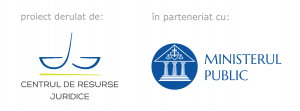About the project:
People with disabilities are confronted with a reduced access to the justice system than others when they need to signal an injustice or a breach of their rights. In this context, it becomes necessary to eliminate all the legislative and technical obstacles so that people with disability can have a total access to the mechanisms that could allow them to file complaints in the courts of justice. The actual legal framework does not allow to adapt the administrative procedures that come with the act of justice nor the access to legal assistance or to a free or at least cheaper legal representation. At the same time, the persons working in the justice system are not trained to understand the needs of the persons with disabilities making these persons become vulnerable in their efforts to access justice.
Today, Romania has around 17.500 persons with disabilities that are still in the state’s specialised institutions and around 56,6 percent have a mental disability. The UN Convention of the Rights of Persons with Disability (CRPD), ratified in Romania through the Law no. 221/2010, recognises the right of all these persons to have free access to justice, equally to others, and forces the Romanian authorities to implement the necessary measures to train all the actors involved in the act of justice.
The purpose of this project is to improve the implementation of the ECtHR decisions and of those taken by the CoE Committee of Ministers that concern the rights of the persons with intellectual and psychosocial disabilities that are deprived of their freedom. The project should help improving the capacity of the actors involved to build an accessible justice and will pilot four mechanisms of protection. The access to justice and the degree of implementation of the international guidelines will be promoted through an advocacy campaign by forming specialists in the the field of intellectual and psychosocial disability and by giving legal advice and representing in the court of justice the persons with disabilities. The national advocacy and communication campaign will also increase the capacity of the persons with disabilities, either adults or children, to have a voice when their rights are not respected.
Objectives:
The general objective of the project:
The improvement of the implementation of the ECtHR and the CoE Committee of Ministers regarding the rights of the persons with intellectual and psychosocial disabilities deprived of their freedom. The project will increase the capacity of the magistrates and the civil society to defend the rights of the persons with disability, will pilot five actions within a mechanism of protection and will propose an Action Plan to prevent the inhuman, degrading and ill treatments in the state administered institutions where the persons with intellectual and psychosocial disabilities are placed.
Specifical objectives:
➡ Increasing the capacity of the national institutions implement five of the ECtHR judgements and one of the decisions of the Committee of Ministers regarding Romania in the field of respecting the rights of the persons with intellectual and psychosocial disabilities by a mix of continuous actions, to inform and support the prosecutors, judges, lawyers, the psychiatrists, the psychologists and social workers but also by an advocacy campaign that should last 23 month.
➡ Facilitating the access to justice for the persons with intellectual and/mental health problems by creating and piloting, for 23 month, a national mechanism of protection of the rights of the persons with disabilities deprived of freedom in the mental health and social care institutions.
➡ The increase of the levels of implementation of the legal international framework regarding the rights of the persons with disabilities by elaborating and disseminating a National Action Plan to prevent the ill treatments in the state institutions where the persons with intellectual and psychosocial disabilities are placed.
Activities:
➡ Training regarding the implementation of the recommendations of the ECtHR, the Committee of Ministers and the CRPD Committee regarding the ill treatments but also training to report and investigate the complaints of the persons with intellectual or psychosocial disabilities deprived of their freedom and to elaborate the legal complaints in from of the ECtHR, the European Commission or the European Union Court of Justice.
➡ Piloting the Mechanism of protection for the persons with disabilities that are placed in state institutions.
➡ Creating a network of psychosocial specialists in the field of mental health and the field of the rights of the persons with intellectual disabilities that will support the courts of law and the prosecutors offices (with pilot projects in Bucharest, Iasi, Timisoara, Cluj, Bihor, Buzau and Sibiu)
➡ Elaborating a handbook for the prevention of torture, inhuman and degrading treatments while depriving the persons with disabilities and mental health problems of their freedom (but also regarding the specific situation of the persons that are under restriction)
➡ Training the non – governmental organizations and the self-representatives with disability to report to the Committee of Ministers and to the UNCRPD Committee.
➡ Elaborating the National Action Plan to prevent the inhuman and degrading treatments, both adults and children, with disabilities/mental health problems finding themselves in psychiatric hospitals, residential centers for persons with disabilities, in the police custody or in jails.
FUNDING
The project is implemented by the Centre for Legal Resources in partnership with The Public Ministry – The Prosecutor’s Office of The High Court of Justice and benefits from a grant of 1.324.994 € offered by Island, Liechtenstein and Norway through the EEA Grants. The aim of this project is to facilitate the access to justice for the persons with intellectual disabilities and/or with mental health problems. The project is financially supported by the EEA Grants 2014-2021. The content of this site does not necessarily reflect the official position of the Program Operator, National Contact Operator or the Financial Mechanism Office. The information and opinions expressed are thereby in the exclusive responsibility of the author/authors.


